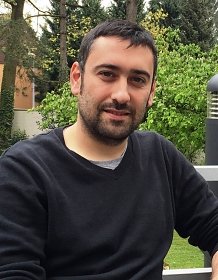From California to Mülheim: Josep Cornellà is new group leader at the Max-Planck-Institut für Kohlenforschung

Dr. Josep Cornellà is a new group leader at the Max-Planck-Institut für Kohlenforschung. He just arrived in spring-like Mülheim and came from California where he worked as a postdoctoral fellow at the renowned The Scripps Research Institute in La Jolla. Cornellà is originally from Spain and will build up the independent research group “Sustainable Catalysis for Organic Synthesis” in the Department of Organometallic Chemistry of Professor Alois Fürstner.
“I was looking very much forward to moving to Mülheim as I whished to work in Europe again and to be near to my family. The Max-Planck-Institut für Kohlenforschung is the perfect place for my research purposes. Here I will be able to work with well-trained colleagues from all over the world and find facilities that fit perfectly to my research aims”, the 32-year-old states. Cornellà started working at the Institute in April and is currently building up his group and learning German. Sustainable catalysts are the main interest of the researcher: “Today the industry uses a lot of transition metals as catalysts that are rare, toxic or high priced such as Iridium, Ruthenium or Palladium. It is my aim to do research on sustainable materials for catalysts, metals that are non-toxic, non-rare and have interesting characteristics such as new reactivity”, he explains.
One of these interesting metals is Bismut (Bi) a rather little used metal that has been explored in the 1970ies but went out of the focus of researchers in the last decades. Bismut is non-toxic, relatively cheap, and can be largely found in the earth crust. Today it serves as a component in the manufacture of alloys but it is also used as a pharmaceutical agent for stomach diseases. “Bismut is so versatile and shows so many interesting characteristics and reactivity that it is worth being explored further. I am grateful that the Max-Planck-Society supports my research projects”, he adds.
Cornellà came with his fiancée to Mülheim and was surprised that after his stay in sunny California he found a city in bloom with abundant nature and nice weather: „In my spare time I love to go hiking, have a drink with friends and enjoy nice restaurants. The trails and paths I tried so far really enchanted me, so that it is easy for me to get familiar with Germany”. The next months will be dedicated to building up a working team that fills up the labs and offices of the laboratory building part reserved for Cornellà.
About Josep Cornellà
Josep Cornellà studied Chemistry at the University of Bacelona where he received his Master of Science in 2008. He did his PhD at the Queen Mary University of London and went to the Institute of Chemical Research of Catalonia in 2012 using the international Marie Curie mobiltiy program for Postdocs. In 2015 he was awarded with the Beatriu de Pinos Fellowship and had the possibility to work as a Postdoc at the renowned The Scripps Research Institute in La Jolla, California. Cornellà did his scientific work with Prof. Phil S. Baran focusing on redox-active esters as cross-coupling partners using transition metals.
In 2017 he was selected by the Max Planck Society to build up an independent research group and chose the Max-Planck-Institut für Kohlenforschung in Mülheim to do this. Cornellà’s group “Sustainable Catalysis for Organic Synthesis“ belongs to the Department of Organometallic Chemistry of Professor Alois Fürstner. The 32-year-old scientist is very happy that at the Institute he finds all the important aspects of catalysis research, a Theory Department and excellent service groups as well as analytical facilities to do his research work.












